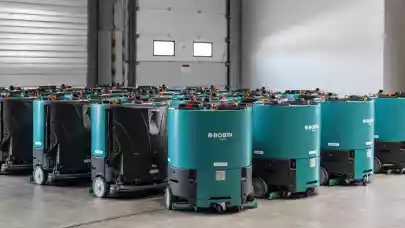
The 75% occupancy limit does not mean working at full capacity, but the recovery of the hotel market is driven by the return of holiday travel and stronger demand for hospitality services. Although the industry is facing a number of challenges, hotel owners hold onto their assets, they are reluctant to sell at a discount, believing that business will return to pre-pandemic levels. JLL summarizes the current situation on the Polish hotel market.
With COVID restrictions lifted, hoteliers are looking to the busy holiday season. However, hotel owners continue to operate against a backdrop of uncertainty connected with a possible fourth wave and the possible return of restrictions, which hampers long-term business planning. In the short term, hoteliers are being helped by an increase in holiday travel, the reopening of restaurants and other hospitality services. The industry is driven by "revenge demand” as guests are looking to make up for months under lockdown and fully capitalise on the summer holiday season.
Appetite for holiday trips
Since the 26th of June this year, hotels have been able to operate with increased occupancy limits - up to 75%, not including those who have vaccinated and children under 12. Hotels in most popular leisure destinations achieve close to full occupancy as the availability of vaccinations has generated more tourist traffic than last year.
"People are exhausted by the effects of the pandemic; they want their freedom back. Vaccinations have instigated a slow return to a new 'normality', and staying at a hotel is a big part of that process", says Agata Janda, Head of Hotel Advisory, JLL.
'New normal' and new challenges
The hotel sector is now warming up and the heat wave has hit tourist destinations, however, clouds are still hanging over gateway cities.
"Although people are returning to hotels located in typical holiday destinations and resorts, city hotels are still waiting for business travellers. Since the outset of the pandemic, many companies have banned or restricted travel resulting in limited number of business stays at hotels as well as the disappearance of conference & events business. Limited international travel has also had a negative impact on weekend breaks activity across major city destinations in Poland such as Kraków, popular for British tourists, and Gdańsk, which is popular for Scandinavians. Currently, the majority of hotel guests are domestic", comments Agata Janda.
The pandemic also has consequences for the labour market. Sectors that have been hard hit by the government-imposed closures, including hospitality and catering, are now facing staff shortages. The loosening of restrictions and the start of the summer holidays means there is great demand for staff. However, many people who had previously worked in hotels, hotel restaurants or cafes have retrained, changed jobs and have not returned after months of uncertainty. This also applies to workers from Ukraine. As a consequence, hoteliers are already looking for new sources of staff far beyond Poland, mainly in Asia, Thailand and the Philippines.
The booking window has shortened - guests now tend to book only a few days before arrival. At the same time, they expect more flexible booking policies, including free cancellation, which makes it harder to plan the business.
A change of lifestyle, expectations and habits
The hotel sector is adapting to new realities and responding to changes in lifestyles, attitudes to travel and work, as well as guests' new expectations.
"Undoubtedly, the COVID-19 pandemic has triggered changes in some hotel trends. These include a surge of the so called 'bleisure' reservations that combine tourist and business stays. This is a natural consequence of the blurring of the boundaries between life, work and travel and a greater popularity of the hybrid work model", explains Agata Janda.
The growing popularity of the hybrid work model creates new opportunities for hoteliers. For example, the CitizenM brand (not yet present in Poland) offers a monthly subscription fee of €500, that includes three nights in a hotel as well as an access to conference & meeting space. The package is tailored for people who work from company’s headquarters only a few days a month. Instead of renting a flat on a long-term basis, it is now more feasible for some to simply rent a hotel room as and when required. In order to attract business travellers, hotels offer remote working packages, such as video conferencing and improved room standards regarding office equipment.
The definition of the hotel guest is also slowly changing, as new urban hotel concepts are opening up to the local community.
"Cities are home to hundreds of thousands of people, who can become hotel customers if the hotel offers inspiring, stimulating spaces: great restaurants, cool bars, relaxed coffee shops, etc. Residents of the city can represent a significant new revenue stream for hotels. In most popular lifestyle hotels, food & beverage sales produce nearly a half of the total hotel revenue and the evidence suggests that as much as 75% of this income can be generated by external guests", adds Agata Janda.
Corporate responsibility and sustainability
Responsible and environmentally conscious travel is a trend that is increasingly influencing tourists when planning their holidays. Not only are they opting for greener modes of transport, but are also choosing sustainable hotels. Brands become more creative in adopting new eco-friendly formulas. For example, the Accor Group supplies their greet-branded hotels with second hand equipment and furniture.
Owners stick to prices
"Although there is capital looking to acquire hotel properties, there has been only one significant hotel transaction this year. This is largely due to mismatch in pricing between sellers and buyers. Opportunistic investors want to mitigate the risk associated with operating in an uncertain hotel market and expect discounted prices as a consequence. Hotel owners, on the other hand, value their assets mainly on the future operational potential once the business returns to full ‘normality’, However, this doesn’t necessarily mean that there are no ongoing negotiations that could end up with successful closure in the foreseeable future", says Jakub Kleban, Senior Director, Valuations, JLL.
In addition, increasing uncertainty due to a possible fourth wave and a reimposition of restrictions, reduces both the activity of buyers, and the involvement of lending institutions. As long as the pandemic persists, it is difficult to make reliable performance forecasts and, consequently, valuation of hotel assets is challenging. This delays investment decisions.
"Although the industry is adapting to the new market realities, it may take 2-3 years for hotel trade to fully recover. It is optimistic to see revenge demand, but it is hard to expect two months of holidays to revive the industry after a long period of shutdown. Some losses can never be recovered. However, on a positive note, the hotel sector is likely to be the quickest to recover As soon as it is safe to travel for all, we will see airports, train stations and hotels filling up", concludes Agata Janda.



